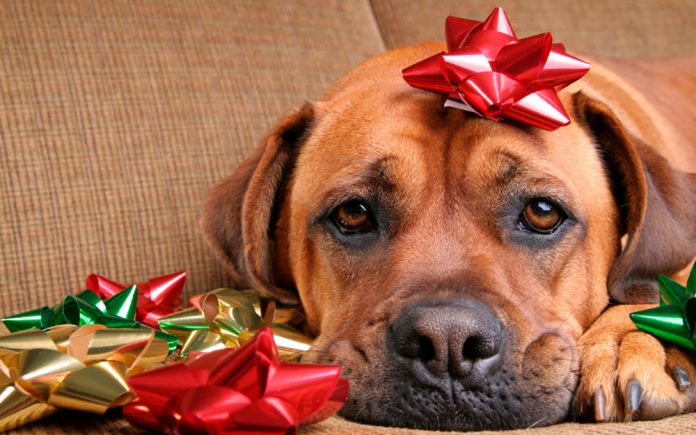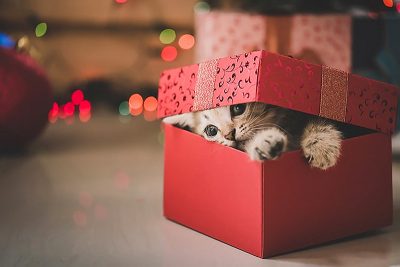
By Janet McAfee
We celebrate Thanksgiving this week, giving thanks over a holiday meal with friends and family. Christmas and New Year’s Day arrive in quick succession. Christmas trees are going up, parties are planned, and holiday lights are brightening our desert. Fido and Fluffy are often included in our plans, and they may linger beneath the table hoping for a holiday treat.
However, this time of year also sees a dramatic increase in emergency trips to the vet for our four-legged friends. In the frenzy of activity, we may overlook the dangers that certain holiday foods, plants and decorations pose to cats and dogs.
One of your dinner party guests might be tempted to give Benji a sample from his plate. Sugar, chocolate, turkey skin, turkey bones, gravy, and avocados can be harmful to a dog. Onions, garlic, raisins, grapes, and nuts, (particularly walnuts and macadamia nuts) are very dangerous when consumed by a dog in large quantities. These same foods are also harmful for cats.
Keep that bowl of holiday candy off the coffee table where a pet can reach it. Chocolate in particular is very dangerous for animals. Candy and gum containing the artificial sweetener xylitol is very hazardous.
Poinsettias are not as toxic as once believed, however sampling a leaf from one can make your dog mildly ill or cause swelling to the skin; even worse than poinsettias are holly, lilies and mistletoe. A kiss under the mistletoe might add romance to your holiday, but it can cause erratic behavior and even cardiovascular collapse when ingested by your pet. Mistletoe berries can also be a hazardous.
Dr. Lillian Roberts of Country Club Animal Clinic in Palm Desert sees a dramatic influx of patients this time of year. She advises, “Avoid ornaments or decorations that are small and easy to swallow, as these can quickly lead to intestinal blockage and emergency surgery. This also includes tinsel, ribbon, and small loose bells that cats find irresistible. I once x-rayed a dog only to discover an entire glass ornament sitting in his stomach. Surgery was needed to get the ornament out.” Dr. Roberts offers these additional tips to keep your animals safe and healthy:
 Unplug Christmas tree lights and other electrical decorations when you are not home. Cords are attractive chew toys for kittens and puppies, and if chewed when plugged in can be very dangerous.
Unplug Christmas tree lights and other electrical decorations when you are not home. Cords are attractive chew toys for kittens and puppies, and if chewed when plugged in can be very dangerous.
Make sure anything you add to the water under your tree is not poisonous. Pets WILL drink from this bowl. Flocked trees are also a bad idea.
You can feed your dog turkey in moderation, but don’t include the skin, bones or gravy. Mixing a high fat meal with holiday stress is a recipe for GI upset.
If your dog has a sensitive stomach or food allergies, don’t share your holiday meal.
Make sure visitors don’t leave gates, doors, and windows open that allow animals to escape.
Refrain from surprising someone with an animal as a gift. Let people experience the joy of selecting a pet that meets their own preference. Accompany them to a shelter to select a pet and pay their adoption fee. Visit the Coachella Valley Animal Campus at 72-050 Pet Land Place, Thousand Palms, (760) 343-3644. View their adoptable animals at www.rcdas.org. Contact Loving All Animals for more adoptable animals at www.lovingallanimals.org, (760) 834-7000. Take a rescue dog or cat home for the holidays!
Keep your vet’s contact information close at hand. The only 24-hr animal hospital in the Coachella Valley is VCA, 46920 Jefferson just north of Highway 111, Indio (760) 342-4712. Contact the 24-hour Pet Poison Helpline at 800-213-6680. Keep these phone numbers on your cell phone in case of an emergency.
I wish you and your 4-legged family members a safe and happy holiday season!










































